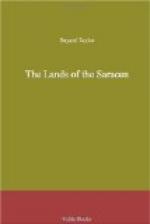Those who are endowed to any extent with the imaginative faculty, must have at least once in their lives experienced feelings which may give them a clue to the exalted sensuous raptures of my triumphal march. The view of a sublime mountain landscape, the hearing of a grand orchestral symphony, or of a choral upborne by the “full-voiced organ,” or even the beauty and luxury of a cloudless summer day, suggests emotions similar in kind, if less intense. They took a warmth and glow from that pure animal joy which degrades not, but spiritualizes and ennobles our material part, and which differs from cold, abstract, intellectual enjoyment, as the flaming diamond of the Orient differs from the icicle of the North. Those finer senses, which occupy a middle ground between our animal and intellectual appetites, were suddenly developed to a pitch beyond what I had ever dreamed, and being thus at one and the same time gratified to the fullest extent of their preternatural capacity, the result was a single harmonious sensation, to describe which human language has no epithet. Mahomet’s Paradise, with its palaces of ruby and emerald, its airs of musk and cassia, and its rivers colder than snow and sweeter than honey, would have been a poor and mean terminus for my arcade of rainbows. Yet in the character of this paradise, in the gorgeous fancies of the Arabian Nights, in the glow and luxury of all Oriental poetry, I now recognize more or less of the agency of hasheesh.
The fulness of my rapture expanded the sense of time; and though the whole vision was probably not more than five minutes in passing through my mind, years seemed to have elapsed while I shot under the dazzling myriads of rainbow arches. By and by, the rainbows, the barque of pearl and jewels, and the desert of golden sand, vanished; and, still bathed in light and perfume, I found myself in a land of green and flowery lawns, divided by hills of gently undulating outline. But, although the vegetation was the richest of earth, there were neither streams nor fountains to be seen; and the people who came from the hills, with brilliant garments that shone in the sun, besought me to give them the blessing of water. Their hands were full of branches of the coral honeysuckle, in bloom. These I took; and, breaking off the flowers one by one, set them in the earth. The slender, trumpet-like tubes immediately became shafts of masonry, and sank deep into the earth; the lip of the flower changed into a circular mouth of rose-colored marble, and the people, leaning over its brink, lowered their pitchers to the bottom with cords, and drew them up again, filled to the brim, and dripping with honey.




